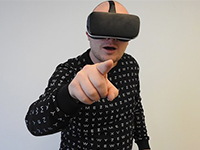|
In this edition of Digital Media Link, we explore the legal issues surrounding new technologies, with a particular focus on augmented and virtual reality. As we have seen time and again, new technologies do not necessarily mean new statutes or case law, which usually are slow to catch up. What is a lawyer to do, then, when advising on the legal issues associated with these new technologies? We do what we were trained to do – apply the existing rules and precedents to the best of our ability, use our knowledge of the technology and these laws to project how the law will develop, and track developments as they occur. Virtual reality and augmented reality remain so new – at least from the perspective of legal jurisprudence – that we are still in the stage of applying established rules and precedents to these up and coming technologies. In the articles that follow, we take a look at several different legal issues related to these new technologies. We hope you will continue to "link" up with us in this important area. |
|
 |
Technology Is Disrupting Fashion Where once many criticized the fashion industry for being slow to evolve, it may now be one of the most tech-savvy industries. Global household names and local brands alike are using emerging technology to better understand consumers, create products that are more customized for individual consumers, and develop new and personalized ways to bring the shopping experience to consumers. In this article we discuss recent examples of technology disrupting fashion and some of the legal implications arising from the use of such technology. |
 |
Augment Your Legal Knowledge of Augmented Reality Have you had a chance to play the game your company developed? If you haven't, now is the time. The best way to understand all of the legal risks it might present is to try out that VR headset or take your mobile AR game to the streets to get the full picture of how it all works. A cousin of augmented reality is mixed reality (MR), which involves the merging of real and virtual worlds. Both AR and MR raise new legal challenges, particularly for intellectual property, privacy, and security practitioners. This article looks at certain of these issues and provides some suggestions about the ways in which practitioners can practically address these concerns. |
 |
Content Is King, but How Will You Protect It? Companies are spending more time and money than ever before generating creative, engaging content. The digital era has made content limitless and methods of engaging consumers almost limitless. But the law is not limitless – it still has bounds, some of which were established long before there were computers, the internet, or discussions about augmented reality and virtual reality. Law lagging behind technological advancement is nothing new. Anyone with a smart phone can copy digital content and repost it somewhere. So how do you take advantage of antiquated laws to protect your content? |
 |
Regulatory Risks of In-Game and In-App Virtual Currency Virtual reality presents the opportunity to create completely immersive experiences. As the technology improves and the consumer base expands, there will be opportunities to create fully immersive worlds where users can interact with other users. These new worlds might have their own economy and their own currency. What that world might look like remains to be seen, but one thing remains true (at least for now): you should not create that world without first considering whether your creation has regulatory issues. This article discusses FinCEN's guidance, the obligations imposed by federal anti-money laundering laws, the features of virtual currency that may trigger regulation, and steps to take to avoid such obligations. |
| VENABLE DIGITAL MEDIA NEWS, EVENTS, AND BEYOND | |
|
In other news, co-editors Po Yi and Kimberly Culp shared their perspective on two emerging legal topics at the Venable-hosted Advertising Law Symposium in April. Po's panel, From Consumer Post to Promotional Campaign – What You Need to Know About User Generated Content, addressed the disastrous uses of experiential marketing and advised consumers on how to avoid these obvious pitfalls. Kimberly, in her session, Terms of Use Are Only Useful if Enforced: How to Craft Enforceable Terms of Use in Mobile, discussed how to incorporate terms of use into mobile application designs in a visually appealing – and enforceable – way. In addition, co-editor Tamany Bentz moderated the panel, Using Trade Secrets, Copyrights, and Trademarks to Protect Software Products, to highlight what you need to know about the Defend Trade Secrets Act as well as best practices for leveraging your trademarks and copyrights to fully protect your brand online, at the IP Software Summit on May 18th. Po also participated in a panel discussion, Mercenary Matters: Technology and the Changing World of Retail, where she discussed strategies for using retail technology to capture customers, at the Fordham Fashion Law Institute 7th Annual Symposium in March. Kimberly also participated in two panel discussions this month: Virtual and Augmented Reality for Games & Entertainment, at the LA Games conference, and AR/VR 101: Where We're at and How We're Building the Future, at the TiEcon 2017 Conference. |
|